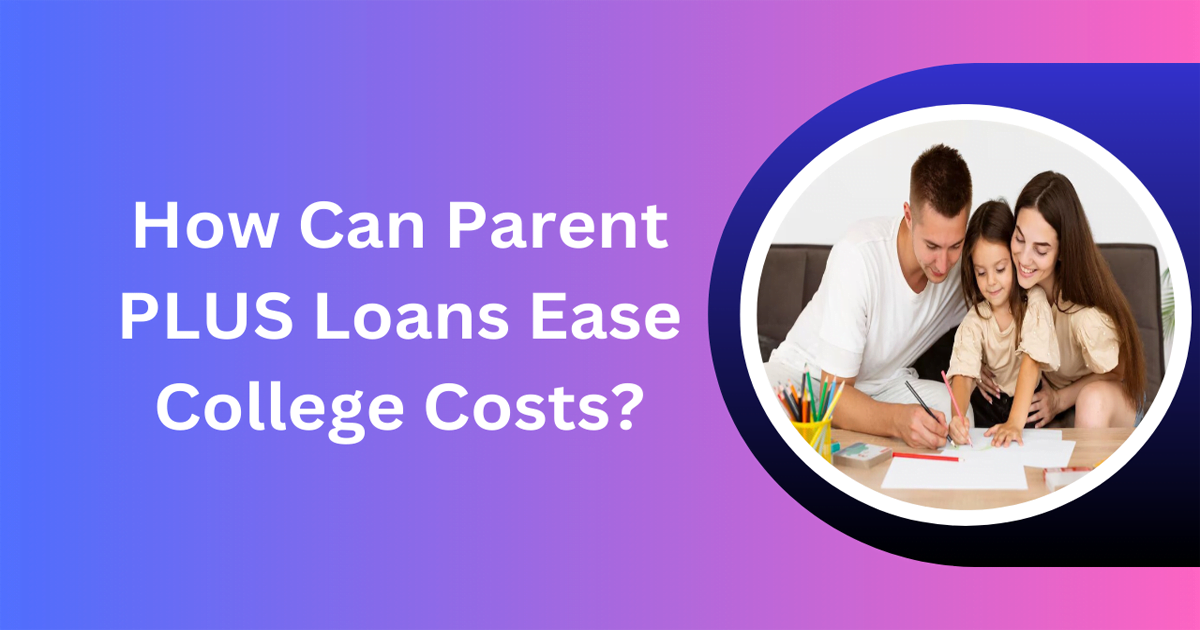PLUS Loans : Paying for college education has become increasingly challenging for many families. The cost of tuition, room and board, books, and other expenses can add up quickly. However, there are several financial aid options available to help alleviate this burden, and one of them is the Parent PLUS Loan. In this article, we will explore what Parent PLUS Loans are, how they work, and their pros and cons.
What Are Parent PLUS Loans?
Parent PLUS Loans are federal loans designed to assist parents in financing their child’s undergraduate education. These loans are part of the Direct Loan Program and are offered by the U.S. Department of Education. They are a popular choice for parents who want to help their children pay for college.
Eligibility For Parent PLUS Loans
To be eligible for a Parent PLUS Loan, you must be the biological or adoptive parent (or, in some cases, the stepparent) of a dependent undergraduate student. You must also be a U.S. citizen or eligible noncitizen, not have an adverse credit history, and your child must be enrolled at least half-time in an eligible institution.
How To Apply For Parent PLUS Loans

To apply for a Parent PLUS Loan, you need to complete the Free Application for Federal Student Aid (FAFSA) and then submit a separate application for the Parent PLUS Loan. The application process includes a credit check to determine your creditworthiness. If you have an adverse credit history, you may still be eligible by obtaining an endorser with good credit.
Interest Rates And fees
Parent PLUS Loans have a fixed interest rate set by the government. As of the 2022-2023 academic year, the interest rate is 6.28%. In addition to the interest rate, there is also a loan fee that is deducted from the loan amount before disbursement.
Loan limits
Parent PLUS Loans allow you to borrow up to the total cost of your child’s education, minus any other financial aid received. This means you can borrow the full amount needed to cover tuition, room and board, and other education-related expenses.
Repayment Options

Repayment for Parent PLUS Loans typically begins once the loan is fully disbursed. However, you have the option to request a deferment while your child is enrolled at least half-time and for an additional six months after they graduate or drop below half-time enrollment. There are also various repayment plans available, including the Income-Contingent Repayment Plan and the Graduated Repayment Plan.
Pros Of Parent PLUS Loans
- Low fixed interest rate: Parent PLUS Loans offer a competitive fixed interest rate, making them an affordable option.
- Flexible repayment plans: The variety of repayment plans allows you to choose one that suits your financial situation.
- No collateral required: You don’t need to provide any collateral to secure a Parent PLUS Loan.
- Tax-deductible interest: In some cases, the interest paid on Parent PLUS Loans may be tax-deductible.
Cons Of Parent PLUS Loans
- Credit check required: An adverse credit history may affect your eligibility for the loan.
- Borrower responsibility: Parents are responsible for repaying the loan, which can be a significant financial commitment.
- Limited forgiveness options: Parent PLUS Loans do not qualify for Public Service Loan Forgiveness or income-driven forgiveness programs.
Alternatives To Parent PLUS Loans

If Parent PLUS Loans don’t seem like the right fit for your family, consider these alternatives:
- Scholarships and grants
- Federal student loans in the student’s name
- Private student loans
- Work-study programs
- Education tax benefits
Tips For managing Parent PLUS Loans
To ensure a smooth repayment process, follow these tips:
- Create a budget
- Communicate with your child about loan responsibilities
- Explore loan forgiveness options
- Make on-time payments
- Seek professional advice if needed
Success Stories
Many families have successfully used Parent PLUS Loans to make higher education accessible for their children. These loans have helped students graduate with less financial stress and a brighter future.
Also Read : What Are The Steps To Successfully Pay Off Your Agricultural Loans?
Conclusion
Parent PLUS Loans can be a valuable tool for parents who want to ease the financial burden of their child’s college education. They offer competitive interest rates, flexible repayment options, and the ability to borrow the full cost of education. However, it’s essential to carefully consider your financial situation and other alternatives before committing to this type of loan.
FAQs
Q1 : Are Parent PLUS Loans only for undergraduate students?
No, Parent PLUS Loans are specifically designed for the parents of dependent undergraduate students.
Q2 : Can I transfer a Parent PLUS Loan to my child?
No, the loan remains the responsibility of the parent, and it cannot be transferred to the child.
Q3 : What happens if I have an adverse credit history?
If you have an adverse credit history, you may still be eligible for a Parent PLUS Loan by obtaining an endorser with good credit.
Q4 : Are Parent PLUS Loans eligible for loan forgiveness programs?
Parent PLUS Loans do not qualify for Public Service Loan Forgiveness or income-driven forgiveness programs.
Q5: How do I apply for a Parent PLUS Loan?
To apply for a Parent PLUS Loan, complete the Free Application for Federal Student Aid (FAFSA) and then submit a separate application for the Parent PLUS Loan.
Source Image : Freepik.com





